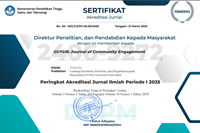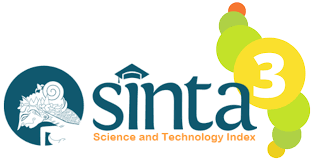Amran, A., Mira, M., Muttiarni, M., & Muhaimin, M. (2023). HIERARCHY PROCESS TO DEVELOP BUSINESS MODEL LEAN CANVAS TO X WOMEN AND CHILDREN’S HOSPITAL. Jesya, 6(1), 1015–1028. https://doi.org/10.36778/jesya.v6i1.1065
Aransyah, Muhammad Fikry., Finnah Fourqoniah, Lilia Pasca Riani. (2023). Enhancing the Student Entrepreneurship Education Model Using Design Thinking and Lean Canvas Approaches. Journal of Social Studies Education Research. 2023: 14 (2), 195-216.
Edalmen, dan Nuringsih, Kartika. (2023). PENGENALAN BUSINESS MODEL CANVAS DALAM PENGEMBANGAN USAHA BARBERSHOP DAVIDOF DI BEJI TIMUR DEPOK. Jurnal Serina Abdimas. DOI: https://doi.org/10.24912/jsa.v1i2.26059
Hardjanti, A., Trisakti, F., Hera, R. A., & Kusumasari, P. (2021). PELATIHAN MEMBUAT PERENCANAAN USAHA YANG BAIK SEBAGAI UPAYA PENINGKATAN KEMAMPUAN PENGELOLAAN USAHA. Jurnal Devosi, 2(2).
Ie, M., & Kezia, C. (2022). Penguatan Ekonomi Bangsa Melalui Inovasi Digital Hasil Penelitian dan PENGENALAN LEAN CANVAS BAGI SISWA/I SMA.
Moshood, Taofeeq D., Gusman Nawanir, Norhana Mohd Aripin, Mohd Hanafiah Ahmad, Khai Loon Lee, Suhaidah Hussain, Yekinni Kolawole Sanusi, W.A. Ajibike. (2022).
Lean business model canvas and sustainable innovation business model based on the industrial synergy of microalgae cultivation. DOI: https://doi.org/10.1016/j.envc.2021.100418
Nidagundi, P., & Novickis, L. (2016). Introducing Lean Canvas Model Adaptation in the Scrum Software Testing. Procedia Computer Science, 104, 97–103. https://doi.org/10.1016/j.procs.2017.01.078
Ojasalo, Jukka., Katri Ojasalo. (2015a). Using Service Logic Business Model Canvas in Lean Service Development. https://www.theseus.fi/bitstream/handle/10024/505126/Ojasalo_Ojasalo.pdf?sequence=2
Ojasalo, J., and Ojasalo, K. (2014), “Using interactive research and constructive method in adapting business model thinking to service logic”, in Services and New Societal Challenges: Innovation for Sustainable Growth and Welfare, Proceedings of the 24th Annual RESER Conference 2014, The European Association for REsearch on SERvices, Helsinki, pp. 1307-1314.
Ojasalo, K., and Ojasalo, J. (2015b), “Adapting business model thinking to service logic: an empirical study on developing a service design tool”, in J. Gummerus, and K. von Koskull (Eds.), The Nordic School – Alternative Perspectives On Marketing And Service Management, Hanken, Helsinki.
Ojasalo, J., and Ojasalo, K. (2015c), “Service logic business model canvas: implications for service business”, Proceedings of the QUIS14 Quality in Service Conference, 18-21 June 2015, Shanghai, China.
Razabillah, N., Raihana, S., Junaedi, P., Plane, O., Daeli, M., & Arasid, N. S. (2023). Lean Canvas and the Business Model Canvas Model in Startup Piecework. Startupreneur Bisnis Digital (SABDA, 2(1). https://doi.org/10.34306/sabda.v2i1.239
Soelaiman, L., Slamet, F., & Puspitowati, I. (2021). ENTREPRENEUR WEEK SEBAGAI WADAH KEGIATAN IMPLEMENTASI MODEL BISNIS MAHASISWA.
Suharto, S. (2022). Implementasi Lean Canvas Sebagai Upaya Meningkatkan Skill Enterpreneurship Mahasiswa Di Perguruan Tinggi. JURNAL NUSANTARA APLIKASI MANAJEMEN BISNIS, 7(1), 149–161. https://doi.org/10.29407/nusamba.v7i1.17965
Sylvia, Chatrine., Andreani Caroline Barus, and Fandi Halim. (2023). Increasing Generation Z Affinity and Creativity for Digital Startup Innovations at SMA St. Thomas 1 Medan. Abdimas Umtas: Jurnal Pengabdian Kepada Masyarakat. Volume: 6 Nomor: 2 E-ISSN: 2614 – 8544.
Tristiyanto, Anie Rose Irawati, Kurnia Muludi, Tantut Wahyu Setyoko. (2020). PEMODELAN BISNIS DENGAN IMPLEMENTASI CUSTOMER DEVELOPMENT MODEL PADA M-BUSINESS STARTUP TERAMPIL. Jurnal Teknoinfo. DOI: DOI : 10.33365/jti.v14i2.672
Voelpel, S., Leibold, M., Tekie, E. and von Krogh, G. (2005), “Escaping the red queen effect in competitive strategy: sense-testing business models”, European Management Journal, Vol. 23 No. 1, pp. 37- 49.
Walansendow, A., El Lagarense, B. S., Wisye Manopo, M., Daud, G., & Sitata Sekolah Tinggi Ilmu Pariwisata Manado, F. (2022). PERANCANGAN BUSINESS MODEL LEAN CANVAS BERBASIS USAH RINTISAN (STARTUP) DI LIKUPANG SEBAGAI DESTINASI PARIWISATA SUPER PRIORITAS DI KABUPATEN MINAHASA UATARA. Jurnal Hospitaliti.
Zott, C. and Amit, R. (2007), “Business model designs and the performance of entrepreneurial firms”, Organization Science, Vol. 18 No. 2, pp. 181-199.
Zott, C. and Amit, R. (2008), “The fit between product market strategy and business model: implications for firm performance”, Strategic Management Journal, Vol. 29 No. 1, pp. 1-26.
 (Institut Teknologi dan Bisnis Tuban)
(Institut Teknologi dan Bisnis Tuban) 









.png)
